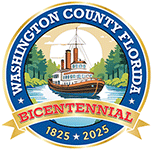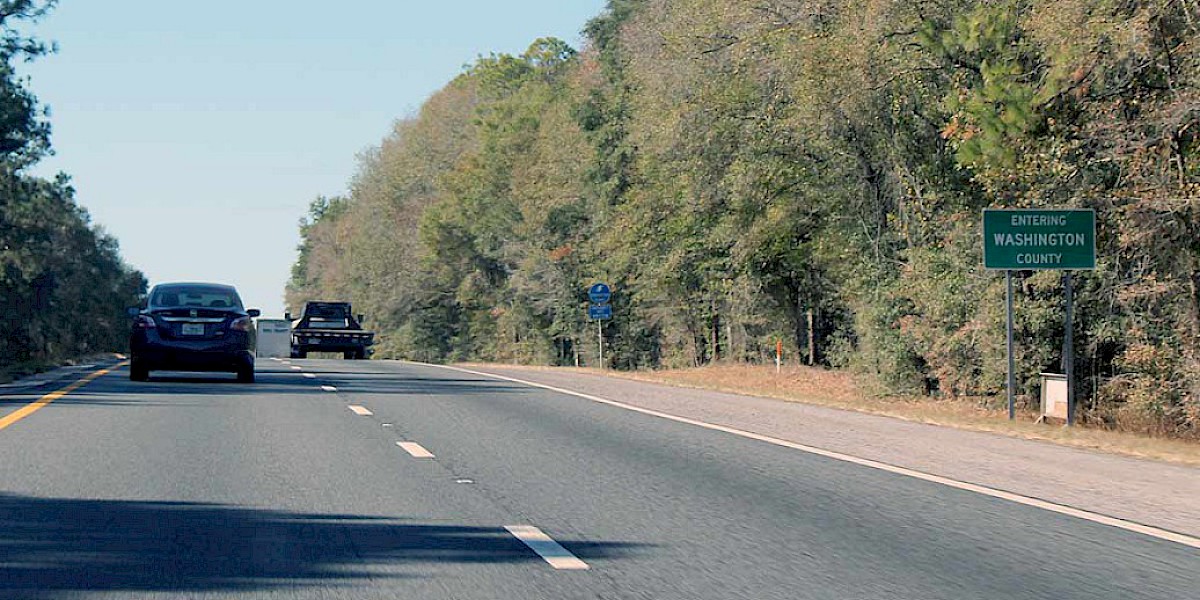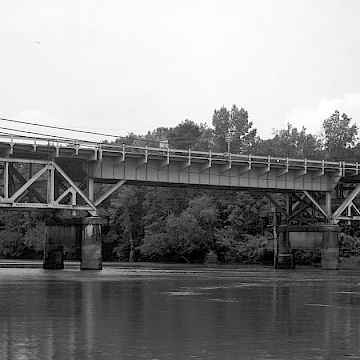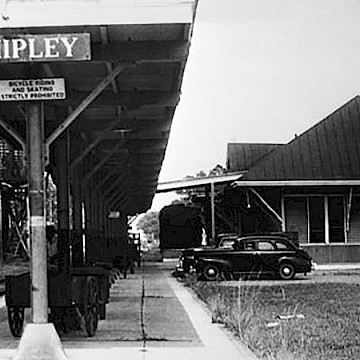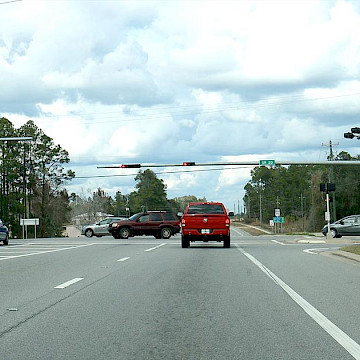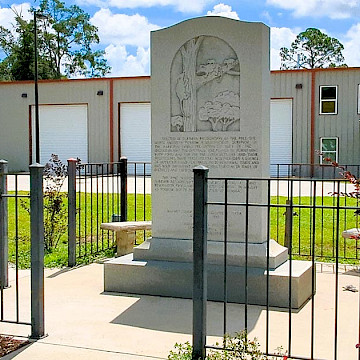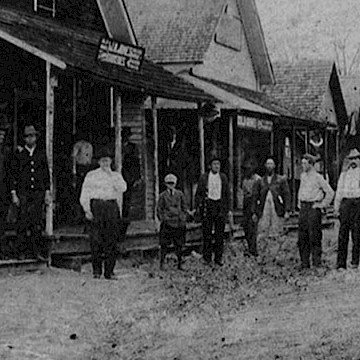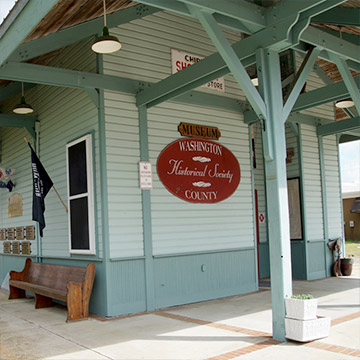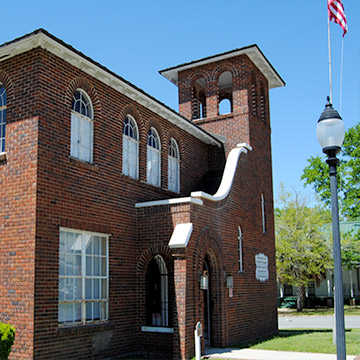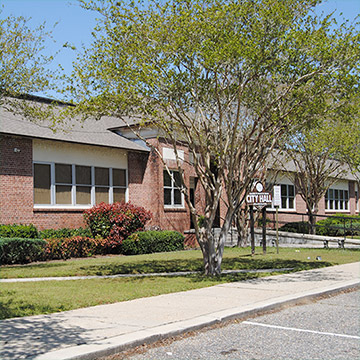OUR HISTORY
of Washington County, Florida
NOTEABLE DATES
December 29, 1825
Washington County was created as Florida's 12th county by the Florida Territorial Council. The first officials were appointed by Governor William P. Duval on March 11, 1826.
1850
Vernon is named the county seat of Washington County.
1882
Originally called Half Moon Bluff, Caryville was established as a sawmill community around 1882 as the Pensacola & Atlantic Railroad (later the L&N) was completed across the Choctawhatchee River. The community quickly became a construction camp for the railroad's development. The workers used the bluff as an operation base, with materials transported up the Choctawhatchee River from Pensacola on steamboats. The town was named after the railroad executive R.M. Cary. The town grew to become a major industrial center, noted for its sawmills that used the river and its tributaries as transportation routes to bring timber downstream from adjoining Holmes County as well as nearby areas of Alabama. At its peak, Caryville was the largest sawmill community in the nation.
1882
The first U.S. settlers of the Washington County area depended on existing trails and waterways for transportation. Unlike Holmes Valley, Vernon, and Orange Hill, the future site of Chipley was isolated from both, slowing development. Although early maps suggest the presence of a fort or blockhouse in the vicinity during the first years of the Seminole Wars (1817-1818), the modern city of Chipley was not founded until the building of the Pensacola & Atlantic Railroad, or P&A, in 1882.
April 1, 1901
Chipley incorporated as a town for the second time. The original incorporation of 1885 was declared invalid. The community's name was changed from Orange, so named because of the numerous orange groves in the area, to Chipley in honor of Col. W.D. Chipley, who founded and helped build the railroad which established Chipley as an economic hub.
March 1902
The "vine that ate the South" was introduced to the United States as a commercial crop at Chipley in 1902. It was first shown in the United States by Japan at the 1876 World's Fair and again at the 1893 "Great White City" Columbian Exposition in Chicago. Mr. and Mrs. C.E. Pleas, nursery owners from Chipley, became big believers in the plant, which can be used as forage for livestock. Plantings of Kudzu soon made their way from Chipley to points throughout the Southeast, including other nurseries. When the Dust Bowl hit in the 1930s and 1940s, the Soil Conservation Service paid $8 per acre to landowners who planted the vine, and the Kudzu boom was on. A historic marker for Kudzu was placed in 1967 at the Washington County Agricultural Center and can be viewed today.
August 4, 1902
A front page headline on this day reported Chipley to be the largest inland shipping point for naval stores. The turpentine industry did well until 1946-47 when the use of turpentine started to decline. By 1970, the business of extracting pitch from pine trees for turpentine was over.
June 2, 1903
In 1903, as a sign of early prosperity, Caryville became the first community in Washington County to receive electric power.
1904
The Birmingham Clumbus and Southport Railroad was built to establish trade of coastal areas. This railroad was later extended to Chipley, connecting it with Southport. In 38 miles, the BC Railroad had 14 stations. The passenger train made a one-way trip in 2 hours. Passenger fare was $1.50 per person one way. On July 4, 1908, the newspaper reported that 470 passengers had ridden the BC Railroad to Chipley for the Fourth of July celebration. The BC Railroad was abandoned in 1939.
July 1, 1908
Oil well operations were underway in Orange Hill. Promoters of oil stock predicted that Washington County would be the biggest oil field in the South. However, this effort failed before the project even got started. Later in 1919, another effort to drill for oil was started at what is now Falling Waters State Park. This effort failed to produce any significant commercial quantities of oil and was capped in 1921. You can still view this site and an interpretive kiosk at the park.
April 24, 1913
Bay County was created causing Washington County to lose two-thirds of its land.
1914
In 1914, the Chipley Power and Light Company went into operation and by 1926 Gulf Power became an operational facility.
March 24, 1921
The Chipley Woman's Club held its first meeting with Mrs. W.C. Lockey presiding as President. This was the first civic club in Chipley. One of the first projects of the Woman's Club was to establish a free public library. The club still meeting in the original building and the clubhouse is now listed on the National Register of Historical Places.
1925
Washington County, like many North Florida counties, had no paved roads when the project began in 1915. When the Old Spanish Trail project was launched from 1915-1916, this improved road was identified as a segment of the new national highway. Goods and raw materials could now be transported to the Chipley rail depot on the new hard roads. With its completion in 1925, the entire section of the Old Spanish Trail (today's Historic Highway 90) through Washington County was opened. By 1929, the entire highway through Florida was connected as thousands of Americans poured into Florida, resulting in considerable economic and demographic growth.
1926
The National Egg Laying Test was placed in Chipley. The first test consisted of 50 pens of 12 hens each. The hens had an average annual production of 185.5 eggs. The purpose of the test was to promote better quality poultry breeds throughout the United States. The current facility, the Poultry Evaluation Center, on Highway 90 continued this effort through the University of Florida until 1997. The facility is currently being used to house the Chipley Animal Shelter.
May 19, 1927
The county seat was moved from Vernon to Chipley after many years of heated debate.
March 17, 1929
The flood of 1929 proved to be the most destructive with the Choctawhatchee River cresting an astounding 15 feet above damage stage forcing a steamboat into a cornfield and a frog infestation.
1930
1930 saw the end of the gopher shipping era from the port of Vernon. Shipped by steamboat to Pensacola almost weekly since 1885, hundreds of gophers were sold to merchants in Pensacola. The gopher was a meat of delicacy in northern markets and among ship captains who used them for fresh meat on long voyages. Vernon was the "World's Leading Gopher Tortoise Shipping Port" between 1885 and 1930.
May 5, 1932
The Chipley Garden Club was organized with Mrs. Maude Coleman presiding as President. The club became known on both state and national levels for its outstanding youth programs.
March 15, 1934
The Washington County Chamber of Commerce was organized with C.L. Jinks presiding as its first President.
1936
The steamboat "Captain Fritz" laden with rosin and spirits of turpentine caught fire and burned near Ebro. Built in Mississippi in 1892 and named for her owner Fritz Lienhard, the Captain Fritz was one of the longest running steamboats that traveled up Holmes Creek to Vernon. It had been in service since 1912 when it sank just down river from present day Cowford Landing in Ebro.
February 4, 1937
The State Road Department (FDOT District 3) district offices were moved to Chipley.
1941
The Chipley Bottling Company began operations in 1941. The company became known for its pint milk drink known as Punch. Punch was a private formula made of milk with vanilla flavoring mixed with a red coloring and cooked under pressure. This facility closed in 1973.
February 17, 1941
The Kiwanis Club was organized in Chipley in 1941. The club was chartered on April 10th with C.A. Rountree presiding as President.
July 10th, 1947
New infrastructure was developed in Washington County to support post-war growth.
February 1st, 1951
The first post office in Caryville, Florida, was opened.
March 8, 1951
Miller's Ferry, the last remaining ferry in Washington County (Bunker's Ferry had ceased operating in 1948), ceased operation when it was replaced by a bridge. The ferry had been in operation since 1824.
September 1952
Washington County received its first County Hospital.
1955
Ebro Greyhound Park opens in Ebro.
April 10, 1956
WBGC began broadcasting radio programs on this day. The call letters were chosen to represent it's listening area of Bonifay, Graceville, and Chipley.
June 16, 1956
The Watermelon Festival was started by Ross Deal and the Watermelon Growers Association. The grassroots organization formed a committee in 1973 and became a non-profit organization with Red Davis as the first chairman. He was followed by Judge Perry Wells in 1976. The Watermelon Festival included a Hog Calling and Rooster Crowing contest, a watermelon seed spitting contest, and a parade. Later, the committee added bluegrass music and a contest for the largest watermelon. Today, the festival is run by Judge Colby Peel and is one of the largest festivals in Washington County, bringing in country recording artists for its Friday night entertainment with the traditional festival held on Saturday.
April 19, 1962
Florida State Parks Board begins the development of Falling Waters State Park after a land swap with International Paper Company. Rep. Ralph Carter and Sen. Dempsey J. Barron along with E.W. Carswell and many other concerned citizens made the park a reality.
August 17, 1967
Washington County Vocational School holds its first classes. Rep. Ralph Carter was the legislator who pushed for vocational schools in rural areas. Wayne Saunders was the first Director of the school.
August 1, 1970
Wausau's FunDay was started by Dalton Carter and the Wausau Development Board. The town of Wausau was incorporated in 1963 and was named by John Barr Glen in honor of his hometown in Wisconsin. The first FunDay included gospel singing and the first parade through downtown Wausau with Congressman Bob Sikes as Grand Marshall. Games such as sack races, foot races, and softball were played followed by a fish fry and beauty contest. The possum auction was added later and FunDay became known as the Possum Festival. The Possum Palace was built in 1978 and is still used for the festival today.
June 1, 1971
Sunny Hills officially opens and begins selling lots. The developers advertised Sunny Hills as a planned city, a first of its kind in Northwest Florida, and sold lots to people worldwide.
August 7, 1982
One of the most unique monuments in the United States, this quaint memorial honors the Oppossum. A marsupial and distant relative of the kangaroo, the possum, as it is known in the South, is memorialized here for its role as food for area families during the dark days of the Great Depression. The monument inscription notes that the first Saturday of each August has been declared Possum Day in Florida by resolution of the state legislature. It was placed by the Wausau Community Development Club on August 7, 1982.
April 1, 1993
Amtrak brings passenger train service back to Chipley. This was the first passenger train service since 1971. The Sunset Limited began triweekly service from Los Angeles to Miami, providing the only transcontinental passenger service in the United States.
August 30, 1994
WalMart SuperCenter opens in Chipley, changing the business climate of the city. The growth that this new retail store started continues to bring changes to Washington County.
January 21st, 2022
Washington County was once a dry county, meaning that the sale of alcoholic beverages was banned in the county. In January 2022, this restriction was removed following a voter referendum in which about two-thirds of voters supported the removal.
COMMUNITY HISTORY
When Washington County was created in 1825, the area within its boundaries contained perhaps few more than 100 families. Most of them were frontier farmers, although a few were engaged in other activities, particularly along the Gulf of Mexico coast. The county’s coastal boundary stretched from East Pass (near today’s Destin) to the mouth of the Apalachicola River. The county’s northern boundary soon extended to the Alabama-Florida line near today’s Geneva, Alabama. Carved from the territory that had been a part of Jackson County (created in 1822) and Walton County (created in 1824), Washington contained a cast region that comprised all of today’s Bay and Gulf Counties, and parts of what now are Franklin, Calhoun, Holmes, Walton and Okaloosa Counties. The county was actually larger than some of the nation’s smaller states. Today Washington County is less than a fourth of its early size.
